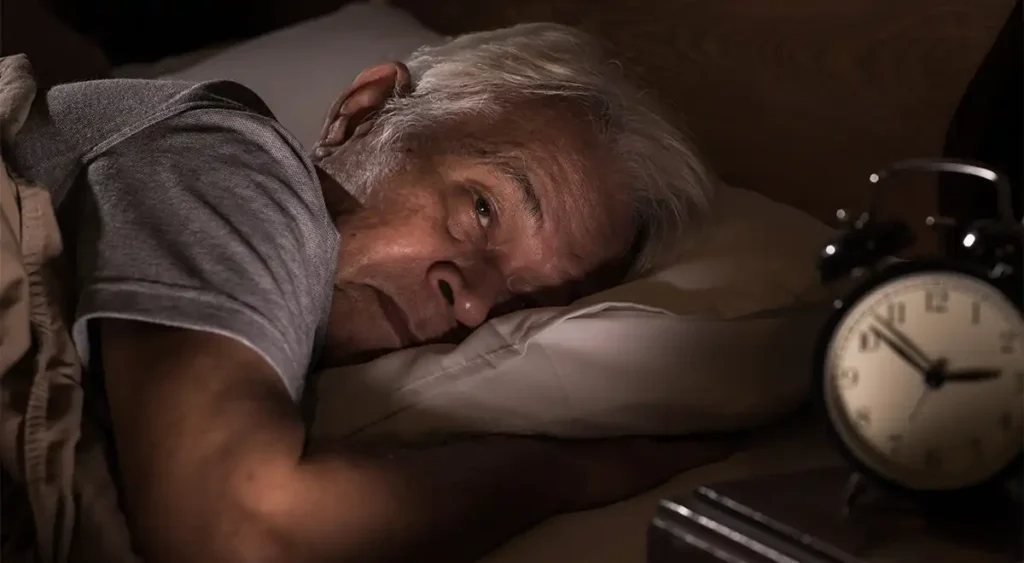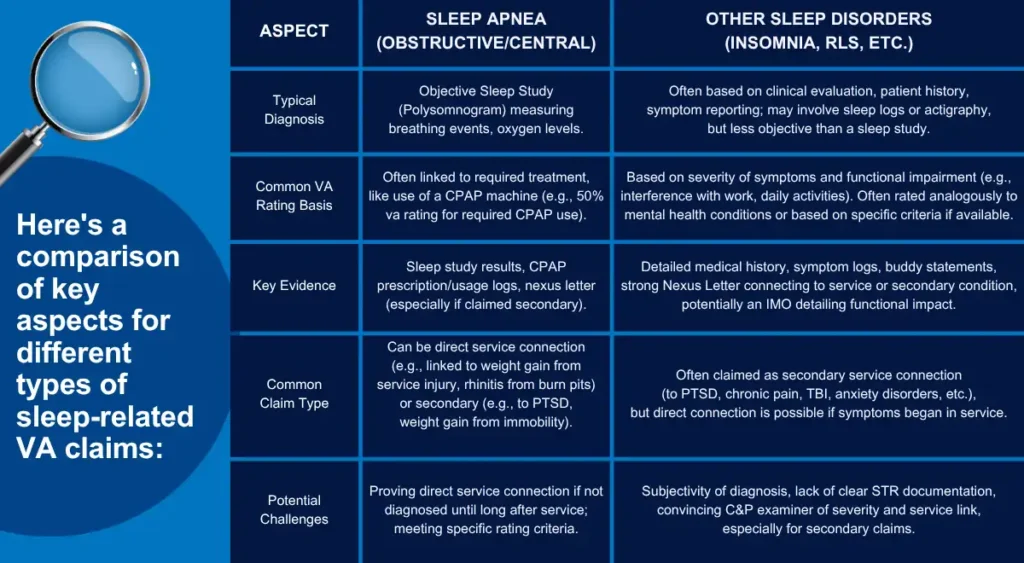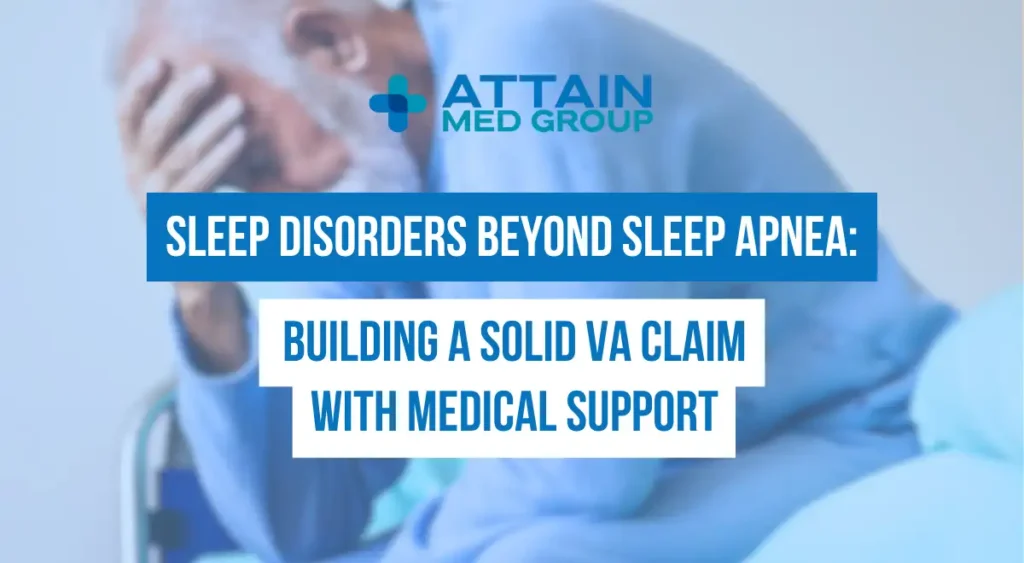Sleep is something we all need. But for many veterans, getting restful sleep feels impossible. You’ve probably heard a lot about sleep apnea claims with the VA; issues like obstructive sleep apnea and central sleep apnea are common topics. It’s a common issue, affecting oxygen levels during sleep, but what if your sleep problem isn’t sleep apnea?
You might be dealing with something else, and filing a va claim for these other issues often feels harder. This piece looks into Sleep Disorders Beyond Sleep Apnea: Building a Solid VA Claim with Medical Support. Getting the right disability benefits depends on showing the Veterans Affairs how your condition impacts you.
Many veterans struggle with conditions like insomnia, restless leg syndrome, or even narcolepsy after service, sometimes linked to experiences like the Gulf War or exposure to burn pits. It’s frustrating when your specific health condition doesn’t fit the typical mold for a sleep apnea va rating. Know that you’re not alone, and there are ways to approach this disability claim; getting the right support is vital for addressing Sleep Disorders Beyond Sleep Apnea: Building a Solid VA Claim with Medical Support.

Sleep Apnea Gets the Spotlight, But What About Other Sleep Problems?
Sleep apnea, whether obstructive sleep or central sleep, gets a lot of attention in the veteran community. That makes sense because it affects many people who served. The VA even has specific ways to assign a disability rating for sleep apnea va cases, often based on things like CPAP machine use following a sleep study.
But military service can disrupt understanding sleep patterns in lots of different ways. Many veterans face serious, chronic sleep issues that aren’t sleep apnea at all. These sleep disorders can severely affect daily life and overall physical health.
Here are some sleep disorders besides apnea that veterans might experience, potentially leading to va disability claims:
- Insomnia: This is a major health issue for many veterans. It means you have persistent problems falling asleep, staying asleep, or getting good quality sleep, leading to significant sleep disturbances. This often happens even if you have the chance for a full night’s rest and can be related to underlying mental health conditions.
- Parasomnias: These are disruptive sleep-related events. Think sleepwalking, sleep terrors, or nightmare disorder. These can be especially linked to trauma experienced during service, such as military sexual trauma (MST).
- Restless Legs Syndrome (RLS): This causes an overwhelming urge to move your legs, a frustrating health disorder. It usually happens when you’re resting, especially in the evening or at night, making it tough to fall asleep or stay asleep.
- Narcolepsy: This is a neurological disorder affecting the brain’s control of sleep-wake cycles. People with narcolepsy experience excessive daytime sleepiness. They might even fall asleep suddenly during activities, which can be dangerous.
- Circadian Rhythm Sleep-Wake Disorders: Your body has an internal clock governing sleep. Military life, with shift work and deployments across time zones, can throw this clock way off, leading to health conditions like delayed sleep phase or irregular sleep-wake patterns. Experiences like Gulf War Syndrome are also associated with such sleep disturbances.
Each of these health disorders impacts life differently. None of them should be ignored just because they aren’t the more commonly discussed service-connected sleep apnea.
Why Claiming These “Other” Sleep Disorders is Tougher
So, why is it often harder to get VA disability benefits for insomnia or RLS compared to obstructive sleep apnea or central sleep apnea? There are a few key reasons. Understanding these challenges helps you prepare a stronger va disability claim.
The Diagnostic Dilemma
Sleep apnea usually gets diagnosed with a sleep study. This test gives objective data, like how many times you stop breathing or your oxygen levels. The VA likes clear, measurable medical documentation like this for establishing service connection and assigning va disability ratings.
But conditions like insomnia or RLS often don’t have a single definitive test. Doctors usually diagnose them based on your reported symptoms, sleep history, and ruling out other causes like anxiety disorders or other mental health disorders. This subjectivity can make VA claims trickier because the evidence feels less concrete to reviewers processing disability claims.
Sometimes, examiners might question the diagnosis if there isn’t a lab test backing it up. This puts more pressure on getting thorough medical documentation of your symptoms and their history to support your disability claim.
Lost in the Records
During your time in military service, maybe you mentioned trouble sleeping to a medic. Perhaps it was brushed off as stress or combat fatigue. Maybe you didn’t report it at all, trying to tough it out due to stigma surrounding mental health or sleep issues.
Unlike a specific injury, sleep problems might not have been clearly documented in your service treatment records (STRs). This lack of in-service documentation makes it harder to establish that direct service connection the VA looks for. You need to show the health condition started or worsened during your military service for successful va disability claims.
Without clear notes in your STRs, you’ll rely more heavily on other forms of evidence. Buddy letters (statements from fellow service members or family/friends who witnessed your struggles) or current medical opinions become very important for bridging this gap in your va claim.

The Examiner’s Opinion
When you file a va disability claim, the Veterans Affairs usually sends you to a Compensation and Pension (C&P) exam. The examiner’s opinion holds a lot of weight in determining your final va rating. Unfortunately, some examiners might not fully grasp the severity of conditions like chronic insomnia or RLS, especially compared to understanding sleep apnea.
They might minimize how much the sleep disorder affects your daily life and ability to work, impacting potential disability ratings. They might also be skeptical about linking it to your service if the connection isn’t obvious or if it’s claimed as a secondary condition. This is especially true for secondary service connection claims, like insomnia caused by PTSD, chronic pain, or even tinnitus.
Getting a favorable opinion often depends on presenting clear, compelling medical evidence beforehand. This evidence needs to show both the diagnosis and the service connection, potentially impacting your overall va disability rating calculated using tools like a disability calculator.
Strong Medical Evidence: Your Path to Benefits
Okay, so claiming these sleep disorders presents hurdles. But that absolutely does not mean you should give up on pursuing va disability benefits. The solution lies in building a rock-solid case based on strong medical evidence.
You need proof that documents your condition, connects it to your service, and explains its impact on your life. Let’s break down the types of evidence that make a huge difference for these disability claims.
Nexus Letters: Connecting the Dots
A Nexus Letter is a statement from a qualified medical professional. It explains how your current medical condition or health disorder is linked to your military service. For these less common sleep disorders, a powerful nexus letter is often essential for establishing service connection.
This letter needs to do more than just state you have insomnia or another sleep disorder. A good nexus letter reviews your medical history, service records, and relevant medical literature. It then gives a clear medical opinion using specific language the VA requires, such as stating your sleep disorder is “at least as likely as not” caused or aggravated by your service or another service-connected condition (establishing secondary service).
For example, a doctor could write a nexus letter explaining how your chronic insomnia likely resulted from hypervigilance associated with your service-connected PTSD or perhaps aggravated by chronic pain from a service injury. That specific language and rationale matter to the VA. As outlined in VA guidance, credible supporting evidence helps demonstrate this connection for your va disability claim.
Medical Record Reviews: Finding the Pattern
Maybe you don’t have a single entry in your STRs explicitly stating “insomnia” or “RLS.” But a careful review of your entire medical history, both military and civilian, might reveal a pattern indicating persistent sleep disturbances. This is where a Medical Record Review becomes invaluable.
An expert can carefully go through your files. They look for mentions of fatigue, difficulty concentrating, prescriptions for sleep aids, notes about anxiety or pain affecting sleep, or other indicators that hinted at sleep problems over time. They might find notes from different doctors visits that, when put together, paint a picture of a developing or worsening sleep disorder potentially linked to your military service or other service-connected conditions.
This review can uncover evidence you didn’t even realize was there. It helps build a timeline and shows the VA this isn’t a brand-new issue but rather a chronic health condition. It demonstrates a history consistent with your current diagnosis, strengthening your case for va disability.
Independent Medical Opinions (IMOs): Proving the Impact
Sometimes, you need more than just a diagnosis and a link for your va claim. You need to clearly show the VA how severely this sleep disorder affects your daily life and functional capacity. An Independent Medical Opinion (IMO) can do just that, offering valuable expert opinions.
An IMO is provided by a private medical expert who evaluates your condition. Unlike a potentially brief C&P exam, an IMO often involves a thorough review of your records and possibly a detailed examination. The expert can then write a detailed report explaining the functional consequences of your sleep disorder.
This report can detail how insomnia impacts your ability to focus, sustain employment, or manage relationships due to irritability and fatigue. It might explain how RLS prevents you from getting restorative sleep, leading to severe daytime sleepiness that limits activity and impacts overall physical health. Documenting symptoms like those described by institutions like the National Institute of Neurological Disorders and Stroke on RLS within an IMO can illustrate these impacts clearly. An IMO gives a clear picture of your limitations, countering any attempt by a C&P examiner to downplay the condition’s severity when determining your disability rating.

Secondary Service Connection: A Common Path for Sleep Disorders
Many sleep disorders in veterans are not directly caused by a specific event in service but arise due to other service-connected conditions. This is known as secondary service connection, a crucial concept for many va claims. Understanding this pathway is vital when dealing with sleep disorders beyond sleep apnea.
For instance, a veteran with service-connected PTSD often experiences chronic insomnia or nightmares (a type of parasomnia) as symptoms of the PTSD. In this case, the sleep disorder can be claimed secondary to the established PTSD diagnosis. The medical evidence, including a strong nexus letter, should clearly link the sleep problem to the primary service-connected condition.
Similarly, chronic pain from a service-related injury frequently disrupts sleep, leading to insomnia or fragmented sleep. Veterans with TBI may also develop sleep disorders. Even conditions linked to environmental exposures, like Agent Orange or burn pits leading to respiratory issues or potentially Gulf War Syndrome, can contribute to sleep problems, potentially forming the basis for a secondary service connection claim or directly service-connected sleep issues.
Other mental health conditions commonly linked to military service, such as depression or anxiety disorders, are strongly associated with sleep disturbances. Furthermore, some service-connected physical health conditions like heart disease or high blood pressure (high blood) might be aggravated by poor sleep, or medications for these conditions could cause sleep problems as a side effect. Building a claim based on secondary service requires demonstrating the link between your primary service-connected condition and the resulting sleep disorder with solid medical documentation and expert opinions.
Here’s a comparison of key aspects for different types of sleep-related VA claims:

Finding the Right Support for Sleep Disorders Beyond Sleep Apnea: Building a Solid VA Claim with Medical Support
Gathering all this specific medical evidence—nexus letters, record reviews, potential IMOs—sounds like a lot, right? It can feel difficult, especially when you’re already dealing with the effects of poor sleep like daytime sleepiness and trouble concentrating. This is where getting the right kind of help makes all the difference in your pursuit of va disability benefits.
You need professionals who understand va claims specifically, not just general medical practice. They need experience with service-connected conditions beyond just sleep apnea va ratings. This specialized knowledge is important for success with these often tougher disability claims for insomnia, RLS, or other sleep health disorders.
Organizations exist that focus on helping veterans with exactly this kind of challenge, providing access to qualified professionals for high-quality Nexus Letters and detailed Medical Record Reviews. Their expertise is particularly helpful for those complex cases involving insomnia, RLS, parasomnias, and other sleep health issues often overlooked or harder to connect directly to service. This support can be invaluable whether you served during the Gulf War, were exposed to Agent Orange, or experienced military sexual trauma that impacts your sleep.
Working with knowledgeable support resources means you get evidence structured to meet the VA’s requirements. They know how to analyze your records and present the medical facts clearly and persuasively. This helps the VA get a well-supported case that accurately shows your health condition and its link to service, making your journey through Sleep Disorders Beyond Sleep Apnea: Building a Solid VA Claim with Medical Support much clearer and increasing your chances of receiving the correct disability rating.
Don’t Give Up on Your Claim
If you’re a veteran struggling with a sleep disorder that isn’t sleep apnea, please don’t assume you can’t get VA benefits. It might be more challenging than an apnea va rating claim, yes. But it’s definitely not impossible to achieve service connection and receive compensation.
Your insomnia, your RLS, your nightmares – these are real health conditions that significantly impact your mental health and physical health. They likely stem from your experiences in military service or are linked to other service-connected conditions like PTSD, chronic pain, or even high blood pressure aggravated by stress. You deserve recognition and support for how these sleep disorders affect your daily life.
The path might involve gathering more detailed medical documentation than a typical service-connected sleep apnea claim. It requires being persistent and potentially seeking expert opinions. But with strong Nexus Letters, thorough record reviews, and potentially a compelling IMO, you can build a successful va disability claim.
Don’t let the perceived difficulty stop you from pursuing the disability benefits you’ve earned through your service. Seek help from those who understand these specific claims and the nuances of establishing direct or secondary service connection. You served your country; now let the system provide the support you need for all your service-connected health issues.
Conclusion
Sleep apnea claims are common, but many veterans battle other significant sleep problems linked to their service. Conditions like insomnia, restless legs syndrome, parasomnias, and narcolepsy deserve attention and VA disability benefits too. Filing for these health disorders often requires more specific and robust medical evidence because diagnoses can be subjective and service connection harder to pinpoint than for sleep apnea va ratings typically established via a sleep study and CPAP machine requirement.
Getting help with Sleep Disorders Beyond Sleep Apnea: Building a Solid VA Claim with Medical Support is vital for navigating the va claims process. Strong nexus letters connecting the disorder to service or secondary conditions, detailed Medical Record Reviews identifying historical evidence, and compelling Independent Medical Opinions explaining functional impact are key tools. These pieces of medical documentation help establish service connection and justify appropriate disability ratings.
Don’t underestimate your condition or assume it’s not worth filing for just because it isn’t sleep apnea; understanding sleep issues beyond apnea is important for veterans affairs. With the right medical support and evidence showing the link to military service or other service-connected conditions and the impact on your daily life, physical health, and mental health, you can successfully pursue your va disability claim and get the benefits you deserve for these impactful sleep disorders.

